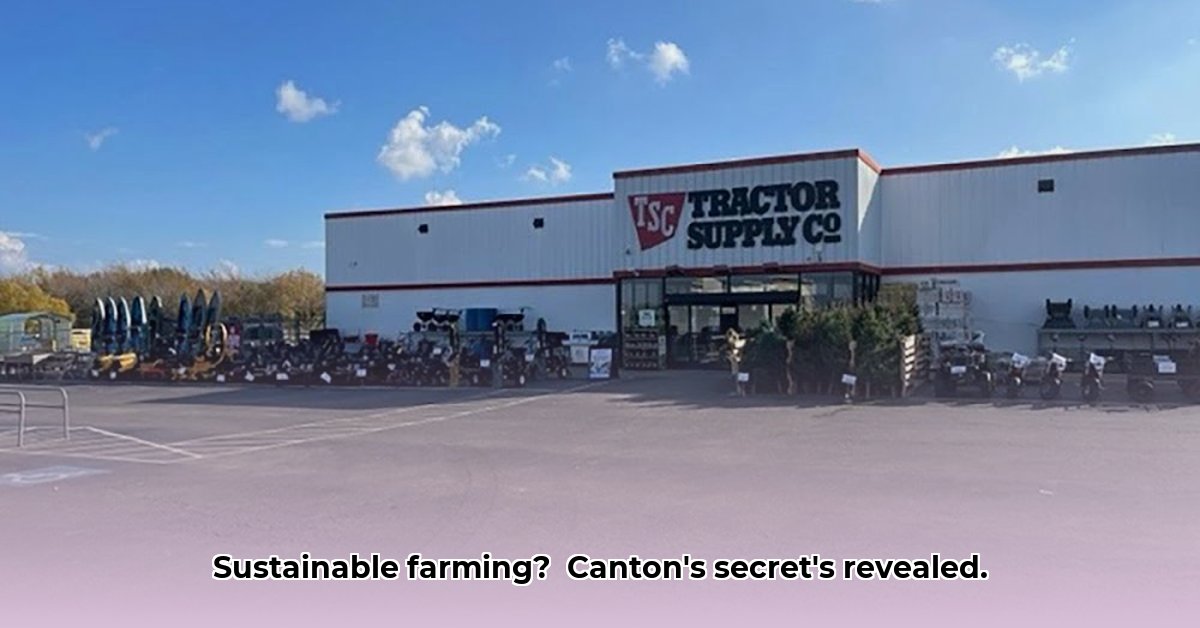
Canton, Mississippi's Tractor Supply store serves as a critical hub for local farmers, providing convenient access to essential supplies and boosting the local economy. However, its role in promoting sustainable farming practices requires closer examination. This article explores Tractor Supply's impact, identifies areas needing improvement, and offers actionable steps for farmers, Tractor Supply itself, and the government to foster a more environmentally responsible agricultural sector in Mississippi. For more information on water-efficient irrigation, check out this helpful resource: Drip irrigation systems.
More Than Just a Convenient Stop: The Economic and Environmental Impact
Tractor Supply's Canton location offers undeniable economic benefits, providing jobs and ensuring the efficient distribution of agricultural necessities to farmers in Madison, Ballard, and Sharon counties. This logistical advantage streamlines operations and enhances productivity. But does this convenience come at an environmental cost? The environmental impact of the products sold and their long-term consequences require careful consideration. This is where the need for transparency becomes paramount.
Unpacking the Sustainability Question: Transparency and Product Profiles
A major hurdle in assessing Tractor Supply's contribution to sustainable farming is the lack of readily available data on the environmental footprint of its products. What types of fertilizers are stocked? Is there a sufficient range of organic options? What about pesticides – are environmentally friendly alternatives prominently displayed? This information gap hinders any comprehensive evaluation of the store's support for sustainable agricultural practices. Without clear product profiles and environmental impact data, it's impossible to fully judge their contribution to sustainable farming. Further research is urgently needed to bridge this gap.
Mississippi's Agricultural Challenges: Opportunities for Sustainable Solutions
Mississippi farmers face unique challenges, including soil erosion, efficient water management, and unpredictable market prices. These factors underscore the importance of sustainable farming practices. Yet, a critical question remains: does Tractor Supply adequately address these challenges by stocking and promoting solutions such as water-saving irrigation systems or organic fertilizers? Currently, insufficient data prevents a conclusive assessment of their role in promoting environmentally responsible farming.
Working Together for a Greener Future: Actionable Recommendations
Achieving sustainable agriculture in Mississippi necessitates a collaborative effort involving farmers, Tractor Supply, the government, and environmental organizations. The following steps outline a path towards a more sustainable future:
For Farmers:
- Informed Purchasing: Carefully evaluate the environmental impact of products before purchase, considering packaging, ingredients, and potential runoff.
- Diversify Suppliers: Explore alternative suppliers offering eco-friendly products if sustainable options at Tractor Supply are limited.
- Voice Your Needs: Communicate your demand for sustainable products directly to Tractor Supply to influence their purchasing decisions.
For Tractor Supply:
- Sustainability Audit: Conduct a thorough audit of products and practices, assessing the environmental impact of the entire supply chain.
- Proactive Sustainability Initiatives: Develop and actively promote environmentally friendly programs, including workshops or educational resources on sustainable farming.
For the Mississippi State Government:
- Regulatory Transparency: Mandate transparent disclosure of product and supply chain sustainability data from retailers.
- Invest in Research: Fund research and development of sustainable agricultural techniques tailored to Mississippi’s unique environment.
For Environmental Organizations:
- Collaborative Partnerships: Partner with Tractor Supply to educate farmers and consumers about sustainable practices through joint initiatives.
- Independent Environmental Assessments: Conduct impartial assessments of Tractor Supply's environmental impact to inform improvements.
Navigating the Risks and Regulations: A Risk Assessment Matrix
The agricultural landscape is constantly evolving, impacted by technological advancements and environmental regulations. A proactive approach to risk management is crucial:
| Technology/Practice | Risk (Low/Medium/High) | Mitigation Strategy |
|---|---|---|
| Conventional Fertilizer Use | Medium | Transition to reduced-input farming; explore organic and biofertilizer options |
| Pesticide Application | Medium | Integrate pest management strategies; utilize biopesticides and IPM techniques |
| Fuel Consumption (Machinery) | Medium | Promote fuel-efficient equipment and explore alternative fuel options like biodiesel |
| Soil Erosion | High | Implement conservation tillage, cover cropping, and other soil-saving techniques |
| Water Resource Management | High | Promote water-efficient irrigation (drip irrigation, etc.), and practices that conserve water resources |
Proactive transparency regarding compliance with current and future regulations is essential for all stakeholders, enabling better informed decision-making.
How to Find Sustainable Farming Supplies at Tractor Supply
Key Takeaways:
- Tractor Supply's role is significant but requires a more conscious approach to sustainable product selection.
- Effective sourcing of sustainable supplies demands careful product evaluation and consideration of individual farming needs.
- Community engagement and ongoing education are critical for progress towards sustainability.
- Governmental support and further research are essential to expand the availability of sustainable products.
Finding Sustainable Options: A Practical Guide
To identify sustainable supplies at Tractor Supply, clearly define your farm's sustainability priorities. Scrutinize product labels for certifications like USDA Organic. Where explicit certifications are lacking, evaluate ingredients and source materials, prioritizing locally sourced options to reduce transportation emissions.
Engaging with the Community: Workshops and Direct Communication
Actively participate in Tractor Supply's workshops and seminars on sustainable farming practices. Engage directly with store staff to discuss your sustainability goals and needs. Their knowledge, combined with your own research, forms a crucial foundation for informed decision-making.
The Role of Government Support: Research and Incentives
Government support is vital for creating a more sustainable agricultural system in Mississippi. Funding research into sustainable practices and offering incentives for their adoption would create a more supportive environment for both farmers and retailers like Tractor Supply.
Actionable Steps: A Three-Pronged Strategy
- Farmers: Prioritize locally sourced products, research sustainable alternatives, attend workshops, and diversify supply sources.
- Tractor Supply: Invest in data collection on the environmental impact of products, improve labeling transparency, and train staff to guide customers towards sustainable choices.
- Mississippi Government: Fund research on sustainable practices, encourage collaboration among stakeholders, and implement incentives for sustainable agriculture.